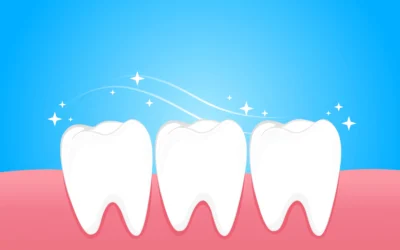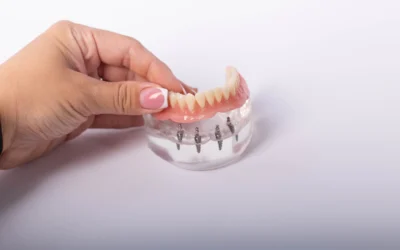If you think back to when you were a kid, you might remember the hygienist or dental assistant putting some kind of foam on your teeth or having you rinse your mouth with a sort of mouthwash. They were probably administering a fluoride treatment.
As kids, we probably didn’t even know what the foam or mouthwash was or why we were getting it. But we didn’t care. All we cared about was picking the best flavor, which may have been grape, bubblegum, or chocolate mint.
We often associate fluoride treatments with kids. This is most likely because as kids are growing up, they may not be the best at brushing or flossing. We want to do the best we can to help strengthen and protect their teeth from cavities.
As we grow into adults, we may think that we have outgrown the need for fluoride treatments. Many insurance companies don’t even cover fluoride treatments past the age of 18. So, the fluoride in your toothpaste and tap water should be enough, right? Wrong.
As we age, fluoride treatments are still important for the health of your teeth. Want to know how fluoride can help?
1. No More Dry Mouth
Does your mouth sometimes feel drier than the Sahara Desert? Having a consistently dry mouth may lead to adult tooth decay. Simply put, when your mouth is dry, there is a reduction in your body’s natural saliva production.
Saliva is vital to the strength of your teeth. Minerals in saliva help repair and protect the surface (enamel) of your teeth. Without enough saliva, teeth are more susceptible to cavities. The lack of saliva can make it easier for bacteria to adhere to your teeth too.
Some causes of dry mouth are:
● Medical Conditions and Medications- Certain medical conditions can cause dry mouth, such as allergies, sinus problems, diabetes, and some autoimmune disorders.
Side effects of some medications can also cause dry mouth. Radiation treatments for things such as cancer can result in damaged saliva glands, which will make for a parched mouth.
● Alcohol and Drug Use- Recreational drugs such as meth and marijuana can cause severe dry mouth. Drinking alcohol can also increase dry mouth symptoms.
● Tobacco- It is no secret that smoking or chewing tobacco can cause multiple health problems. In addition, tobacco can also lead to dry mouth and gum disease.
● Sleep Habits– Sleeping with your mouth open or regular snoring may not only annoy your significant other, but it can cause you to wake up with a pretty dry mouth. If you need to use a CPAP machine at night, you may also experience a dry mouth.
Numerous things could lead to dry mouth, but regular fluoride treatments from your dentist can help.
2. Goodbye Sensitive Teeth, Hello Ice Cream
An ice cream cone or a hot cup of coffee should be something to look forward to and enjoy. But, for some people, these types of treats can cause nothing but pain. The pain we are talking about is sensitive teeth.
Sensitive teeth are a painful reality for many adults. Several things can cause tooth sensitivity, including acidic foods, gum disease, tooth decay, teeth whitening, etc. Fluoride treatments can help strengthen your tooth enamel and lessen sensitivity.
If you suffer from sensitive teeth and want to enjoy things like ice cream and coffee again, you should consider starting regular fluoride treatments. Let sensitive teeth be nothing but a painful memory.
3. Not My Gum Line Too
Much like the hairline of most middle-aged men, our gums can start to recede as we age. Gum recession is basically when the gums of our teeth wear away, exposing the roots beneath.
As with our hairlines, receding gum lines can simply be a result of genetics. But, other things can cause receding gums, such as smoking or brushing your teeth too hard.
Since the newly exposed tooth enamel is softer than your regular enamel, these teeth become more prone to tooth decay. Fluoride treatments can help prevent receding gums and help protect the more delicate enamel of teeth that already have some gum recession.
4. Do I Have to Floss Every Day?
Brushing your teeth for two minutes twice daily and flossing at least once a day can seem tiresome. However, following these guidelines is critical for the overall health of your teeth. Tooth decay and other tooth problems are less likely in people who brush and floss regularly.
We get it; life is busy, and sometimes we can easily put brushing and flossing on the backburner. So, if for whatever reason, your brushing and flossing regimens are less than ideal, regular fluoride treatments can help fill in the gaps, giving your teeth some much-needed strength.
5. We Can Tell You’ve Had Some Work Done
Having specific dental work done is most often in the best interest of your teeth. But, dental work, such as fillings, crowns, or bridges, can leave hard-to-clean areas on your teeth where bacteria can sit. Sounds gross, right? It is. Not only is it gross, but this bacteria can also lead to tooth decay.
Regular dental cleanings can help remove that gross bacteria. Including a fluoride treatment in your visit can strengthen your teeth against any future bacteria.
If you never had braces as a youth and choose to have them as an adult, fluoride will help keep your teeth strong during your orthodontic treatment.
Fluoride treatments are relatively inexpensive compared to any dental work you may need as a result of weakened or decaying teeth. So, even if your insurance doesn’t cover adult fluoride treatments, or you have no insurance for dental services, the treatments won’t break the bank.
There’s a saying that states, “An ounce of prevention is worth a pound of cure.” This is true when it comes to your oral health. If fluoride can help prevent any major dental work or tooth problems, the cost of treatment is worth it. Make fluoride a part of your regular dental service.



